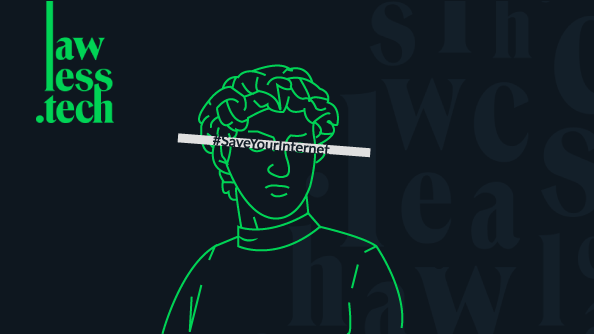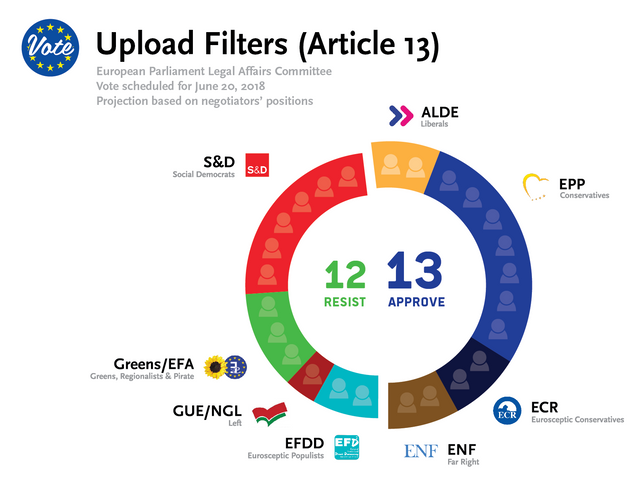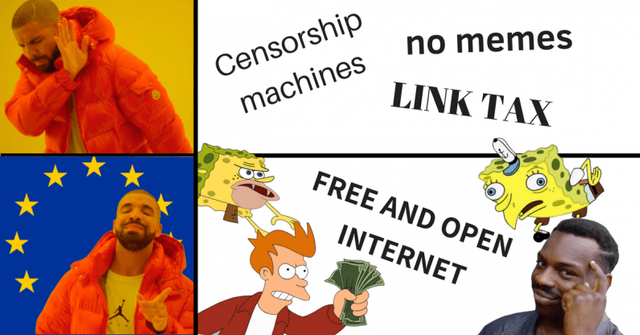Can Internet Be Censored?

Recently, the EU attempted to shoot for a specific copyright legislation to protect the rights of unique content creators by addressing the issues of licensing in particular. However, the reaction from the public seems couldn’t be farther from calm.
New EU Copyright Directive
On June 20th, the EU’s Legal Affairs Committee (JURI) approved a new piece of legislation from the European Commission and the Council on Copyright in the Digital Single Market, otherwise known as the Copyright Directive. The Directive is a follow up to the EU’s Digital Single Market Strategy, the main aim of which was to level the differences in copyright regulation across EU member states.
The Explanatory Memorandum of the Directive suggests that the document’s prime objective is to match the existing regulation on the copyright-protected content with the current technological realities. In particular, the Commission seeks to provide a “fair balance between the rights and interests of authors and other rightholders on the one hand, and of users on the other.”
The Copyright Directive, however, seems to focus on other matters as well. In particular, the Commission claims it would concentrate on the following areas:
- Digital and cross-border uses in the field of education.
- Text and data mining in the field of scientific research.
- Preservation of cultural heritage.
However, it appears that the regulation tackles broader aspects of copyright protection, rather than solely those of the educational field. The Copyright Directive indeed puts an emphasis on the obstacles that stem from the complexity of the rights clearance and licensing, which can objectively influence the accessibility of cultural heritage.
Notably, the Directive recognizes that the Internet has already become the global platform for sharing a variety of content. And, to a certain extent, the founders of Internet could be glad with what it has achieved in certain areas now. However, the accessibility of virtually everything there is poses a threat to copyright-protected content.
The document goes on:
In this new framework, rightholders face difficulties when seeking to license their rights and be remunerated for the online distribution of their works.
Therefore, the regulators attempt to protect the rights of authors and rightholders. In particular, they aim to do so through the negotiations between rightholders and online platforms via obtaining access to the user-uploaded content. The regulation also addresses the issues of online licensing of the content to provide the authors with a fair remuneration of their investment and the enforcement of their rights. This, in turn, will close the so-called “value gap” between the platforms and the rightholders.
Generally speaking, the regulation tries to address certain issues that authors have been facing, probably, since the dawn of the Internet. Yet, there are some provisions that triggered a turbulent and at times very harsh reaction in the community. In particular, Articles 11 and 13 of the Directive are in the spotlight now.
Thus, Article 11 concerning the protection of press publications with respect to digital uses stipulates:
Member States shall provide publishers of press publications with the rights provided for in Article 2 and Article 3(2) of Directive 2001/29/EC for the digital use of their press publications. […]
The rights referred to in the respective Directive 2001/29/EC are as follows:
The right for reproduction, i.e. “the right to authorise or prohibit direct or indirect, temporary or permanent reproduction [of a work, performance etc] by any means and in any form” (Article 2).
The right of communication, i.e. “the right to authorise or prohibit any communication to the public of their works, by wire or wireless means, including the making available to the public of their works in such a way that members of the public may access them from a place and at a time individually chosen by them” (Article 3).
The much-discussed Article 13 concerning the use of protected content prescribes:
Information society service providers that store and provide to the public access to large amounts of works or other subject-matter uploaded by their users shall, in cooperation with rightholders, take measures to ensure the functioning of agreements concluded with rightholders for the use of their works or other subject-matter or to prevent the availability on their services of works or other subject-matter identified by rightholders through the cooperation with the service providers. Those measures, such as the use of effective content recognition technologies, shall be appropriate and proportionate. The service providers shall provide rightholders with adequate information on the functioning and the deployment of the measures, as well as, when relevant, adequate reporting on the recognition and use of the works and other subject-matter.
The regulation proposed by the Commission faced an immense reaction from different parties, who claim that in case it is to be adopted by the European Parliament, it might as well censor the Internet altogether.
Online Censorship: Regulators vs General Public
So, what’s that wrong with this phrasing that caused such a backlash? Apparently, the Article 11 could enforce a “link tax”, which means that huge online platforms will be forced to buy licenses to link the stories of big media platforms. Article 13 entails an “upload filter” which will be used to filter any content for copyright infringement before it is even made public online.
In an open letter to Antonio Tajani, the President of the European Parliament, the Electronic Frontier Foundation (EFF), the leading nonprofit organization defending civil liberties in the digital world, actually agreed with the intention the regulation under Article 13 had.
“As creators ourselves, we share the concern that there should be a fair distribution of revenues from the online use of copyright works, that benefits creators, publishers, and platforms alike,” the signees explained.
However, the overtone of the letter is rather alarming. Specifically, the signees do not agree with the way the regulator wants to protect the rights of the authors:
“Article 13 takes an unprecedented step towards the transformation of the Internet from an open platform for sharing and innovation, into a tool for the automated surveillance and control of its users.”
The signees want to draw the regulator’s attention to a possibly revolutionary implication this Article introduces, namely, reversing the content liability model. The established practice indicates that any content available online is deemed to be legal until proven otherwise. It means that any platform has to be notified that the content might be sensitive, breaching a copyright or otherwise illegal. This can be done in various ways, usually through user’s concrete action to flag such content. However, the signees state that “by inverting this liability model and essentially making platforms directly responsible for ensuring the legality of content in the first instance, the business models and investments of platforms large and small will be impacted.”
Actually, there is a practice in place where content is already being filtered. The tools for such filtering are provided by the content platforms themselves. For example, among the most recognizable solutions in this field is YouTube’s Content ID. Through the system, the owners of the content can track whether it’s being used by somebody else anywhere and anyhow on YouTube. Should that be an audio, video or even a melody, Content ID can identify a similar content against a huge database of copyrighted material. Probably, the most important part of the tool is its flexibility: the creators have multiple choices what to do with that content instead of just taking it down. For example, they can monetize it, or track the statistics.
The opponents of Article 13 stress that the regulation, when enforced, may fundamentally infringe civil liberties, but don’t think it will be that easy to enforce. In an interview with the Next Web Raegan MacDonald, Senior Policy Manager and EU Principal at Mozilla, said that “even Content ID [that YouTube] have made themselves with cutting edge machine learning technology and have honed and improved over the last 11 years — is still utterly imperfect. It’s still incredibly flawed when it comes to perfectly detecting copyright infringement.” The cases of mistakenly flagged content have been there for a long time: chirping birds, or NASA’s Mars landing video, to name a few.
However, the reaction of the public doesn’t stop there. Probably, the most noticeable feature of this issue is the number of public campaigns around it. SaveYourInternet, Say No to Online Censorship, #SaveTheMeme, Create-Refresh, Save Codeshare are just some of them. They offer one to sign an open letter, a contact-your-MEP tool, and other options to raise awareness around the topic.
On Twitter, people are talking in almost all the European languages about the issue:

When the reaction from the public seems to be this fierce, one might expect the regulator to seek additional advice and generally reconsider the initial idea. However, nothing is easy inside the European Parliament. Gizmodo informs that “Article 11 narrowly passed with a vote of 13 to 12 and Article 13 passed with a wider margin of 15 to 10.” Such a close margin in both cases signifies that both parties within the Parliament are actively lobbying to sustain their positions. However, the voting predictions were slightly different. The margin on the vote for the Article 13 was expected to be much narrower in favour of the Directive proponents.

The leading figures in this issue are MEPs Axel Voss (CDU, EPP) and Julia Reda (Pirate Party, Greens-EFA).
Axel Voss, the Parliament’s rapporteur on copyright in the digital single market, is a full supporter of the Directive. His beliefs focus vastly on the benefits of such a legislative update, as the current law in force is of 2001. In an interview to the Parliament Magazine Voss stated that “we must close the immense gap between the content originators (who earn nothing from online publication) and the platforms (which build whole business models upon this principle).” Therefore, he believes that there should be proper licensing rules for the copyrighted content while referring to the Article 11. Voss also widely supports the ‘upload monitoring’ policy stating that rightholders should not be constantly checking whether their content has been illegally published somewhere. Answering to the critique on the censorship and the freedom of expression restriction he says:
“That is simply wrong, incredibly exaggerated, and constantly repeating this false statement doesn’t make it true.”
His main rival, Julia Reda, the member of the Committee on Legal Affairs, extensively contests the proposed legislation. She even has her own website on the topic of the disputed Articles. In an interview to the Next Web she said:
Obviously, it is impossible to predict what copyrighted material users will upload in the future, and the proposal is in no way limited to particular types of copyrighted content. That means that in order to comply with the law, platforms would have to obtain a license for each of billions of copyright-protected works in the world, because they might be uploaded in the future and the platform would be liable for copyright infringement as soon as the material would become available. As this is impossible for even the largest platform, operators will have no choice but to try to mitigate their liability through automated filters.
So, their concerns are understandable. However, what are the exact implications of the Directive?
What’s Going to Happen when the Directive Comes Into Effect
Articles 11 and 13 still have to undergo the plenary voting in the European Parliament to become a law.
The European Parliament will proceed with the vote on the regulation on July 4 or 5 2018. The Copyright Directive may also undergo the so-called “trilogue negotiations” which will create a platform for its discussion between the EU legislators and member states.
If the Copyright Directive is voted in, the adoption process will begin already in spring 2019. Each EU member state will be expected to implement the new rules by 2021. Whether UK will follow still remains to be seen.
At a current stage, that is hard to accurately predict the potential impact in case the Articles become the law.
Firstly, the impact concerns the possibility of different internet platforms to provide ‘upload filters,’ not even mentioning the adequateness of such. For example, the impact of the Article 13 can be drastic for medium-sized and small platforms as they will be quite restricted to comply with it. The EFF realizing the issue stated in their open letter:
“The cost of putting in place the necessary automatic filtering technologies will be expensive and burdensome, and yet those technologies have still not developed to a point where their reliability can be guaranteed.”
The Verge also mentions that “it’ll not only be a significant burden to them, but they’re likely to do a much worse job” highlighting the case of FOSTA Act in the United States, which was designed to combat sex trafficking on the internet, and Switter, social media space for sex workers.
Julia Reda also drew the attention to such implications. Thus, she mentioned Fotocommunity.de, a photo hosting platform, which will have to process enormous amounts of data so as to make sure that every single uploaded photo is not breaching the existing copyright with the intent to close the “value gap”.
Secondly, such a copyright protection may restrict creative people to produce content. For example, video covers on popular songs will be considered illegal even without the rightholder having a say in this regard. In one of TEDTalks videos, Margaret Gould Stewart, former Director of User Experience at YouTube, spoke of such an exceptional experience. She brought up the case of one of Drake’s videos and a wedding video that has the artist’s song in the background. In the short amount of time the video went viral reaching over 40 million views. “And instead of Sony blocking, they allowed the upload to occur. And they put advertising against it and linked from it to iTunes. And the song, 18 months old, went back to number four on the iTunes charts,” she explained. Hence, Sony didn’t even feel the “value gap” since it was monetizing from both the original video and the wedding one. And, the more the better: the couple found themselves in a bunch of talk shows. They even inspired over $26,000 in donations to end domestic violence.
In the same open letter, the EFF stressed that “the impact of Article 13 would also fall heavily on ordinary users of Internet platforms— not only those who upload music or video (frequently in reliance upon copyright limitations and exceptions, that Article 13 ignores), but even those who contribute photos, text, or computer code to open collaboration platforms such as Wikipedia and GitHub.”
But, most tragically to most of us, it even may lead to the ban of memes.

Raegan MacDonald told the Next Web:
It won’t go unnoticed by people if article 13 ends up becoming law […]. There isn’t a clear fair use clause in the reform so [it might be that] that parody, satire, and even protest videos at risk as they could get caught up in and removed by such filters. Therefore we might see a lot of legitimate speech censored.
Hence, there is a chance that much content will become restricted, and the freedom of speech defied.
Conclusion
Once an artist, a creator, or even simply a fan interacts with a creative work online, they become a part of the complex digital environment. And they have to follow the specific rules that were designed to make such an interaction possible. In fact, we encounter copyright almost on a daily basis. “Rights management is no longer simply a question of ownership, it’s a complex web of relationships and a critical part of our cultural landscape,” says Margaret Gould Stewart in her TEDTalk.
The Max Plank Institute for Innovation and Competition stated in their Conclusion on the regulation:
“It [also] does not mean that new – and in particular technology-based – obligations cannot be imposed on service providers, which act beyond the liability exemption. Such legislative measures should simply be better coordinated; an isolated approach, as attempted with Article 13 of the proposed Directive, is not promising.”
The concerns raised by the community seem to be fair enough when it comes to the complex issues of parity between the rightholders and the users. However, is the proposed balance proportionate?
This post originally appeared at https://lawless.tech/can-internet-be-censored/
lawless.tech is an online magazine devoted to covering the ongoing regulatory attempts to oversee and control the newest technologies
Join our Telegram channel, follow us on Twitter and Facebook to explore how regulations will impact the latest technological advances.
Please Upvote➜https://steemit.com/christianity/@bible.com/verse-of-the-day-revelation-21-8-niv